Naksan Temple: A Guide To The Seaside Temple In Yangyang-Gun
A few years ago I remember hearing someone remark that Haedong Yonggungsa Temple in Busan was the only seaside temple in Korea. I sat back in my chair and thought about my trip to Naksansa Temple (낙산사) in Yangyang-gun and how it most surely must count as a seaside temple with a pavilion and paths that literally take you to Naksan Beach and waves that splash against the cliffs beneath your feet.
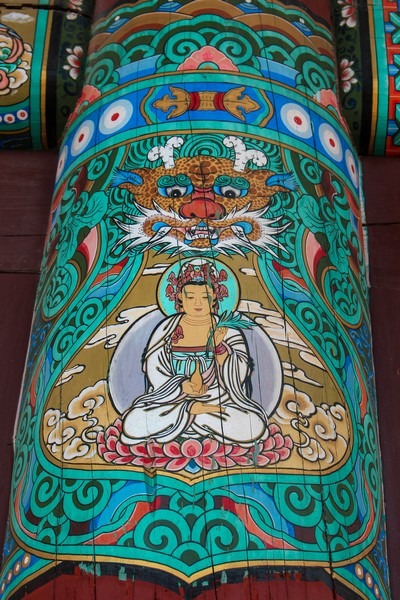
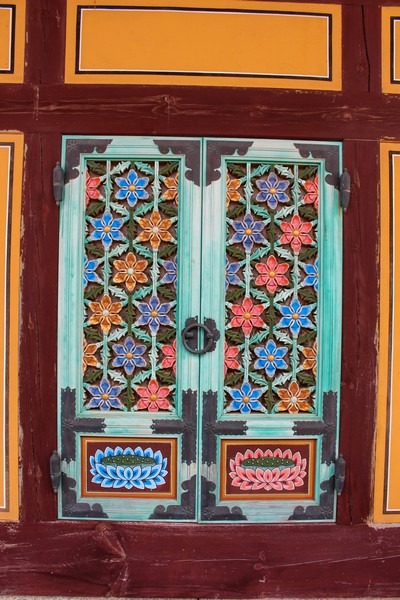
There are often signs placed on landmarks on sites here that read the “tallest this”, or the “largest that” and they will be a string of words that are technically correct, but not really true in the way that most people will read them. Take Nammireuksa Temple in Gangjin, for example. The signs all over the place will tell you that it has “the largest seated brass Buddha in Asia”. Now, I’ve gotten so many comments from readers regarding how it can’t possibly be larger than this one here or that one there so I read into it a bit more and I think where they get it is that it reads “the largest seated BRASS Buddha”.
It’s not the largest seated Buddha, but they could take top seat for the largest seated brass one. It’s a play on words like that that I often find amusing and you really have to pay attention. Back to my point, Naksansa Temple sits on a cliff that overlooks Naksan Beach and the temple boundaries skirt the edge where the land meets sea and comes down on the other side of a mountain too.
It’s not exactly out there facing the ocean like Haedong Yonggungsa Temple, but it is a beautiful seaside temple to enjoy when you’re headed to the east coast of Korea.
Here’s what you need to know about Naksan Temple.
(This post contains affiliate links, which means I receive a certain percentage of a sale if you purchase after clicking at no cost to you. Thank you for your support.)
How To Get There
Address: 100 Naksansa-ro Ganghyeon-myeon Yangyang-gun, Gangwon-do (강원 양양군 강현면 낙산사로 100)
By Bus: Take a bus from Seoul Express Bus Terminal to Yangyang Intercity Bus Terminal, take bus 9 or 9-1 to Naksansa Temple. Takes approximately 10-15 minutes. If you’re at Naksan Beach, just look to the northern end and you’ll find the temple on the hill overlooking the beach.
On A Tour
- If you’re interested in visiting the temple and seeing the gorgeous views from Seoraksan Mountain, you can sign up for a great tour either on Klook or on Viator. You can visit this famous mountain in South Korea and come down to see the temple and coast all in one day.
Basic Information
Hours: 6:00am ~ 8:30pm
Admission: Adults W3,000; Teenagers & Students W1,500; Children W1,000
Amenities: restrooms, parking (W3,000), cafe, restaurant with free noodle soup during lunch hours
Templestay Program: Naksan Temple does offer a templstay program. If you’re interested in visiting. Check out the Templestay.com site.
Where To Stay On Naksan Beach
The Suites Hotel Naksan
The rooms are clean and spacious and the private balconies of every room look out over Naksan Beach. The hotel also has free laundry facilities for guests which is great when you’re spending time on the beach and don’t want to truck home with all of your sandy clothes. The simple modern rooms are perfect for every kind of traveler.
You can book a stay at the Suites Hotel Naksan on Booking.com or on Agoda.com
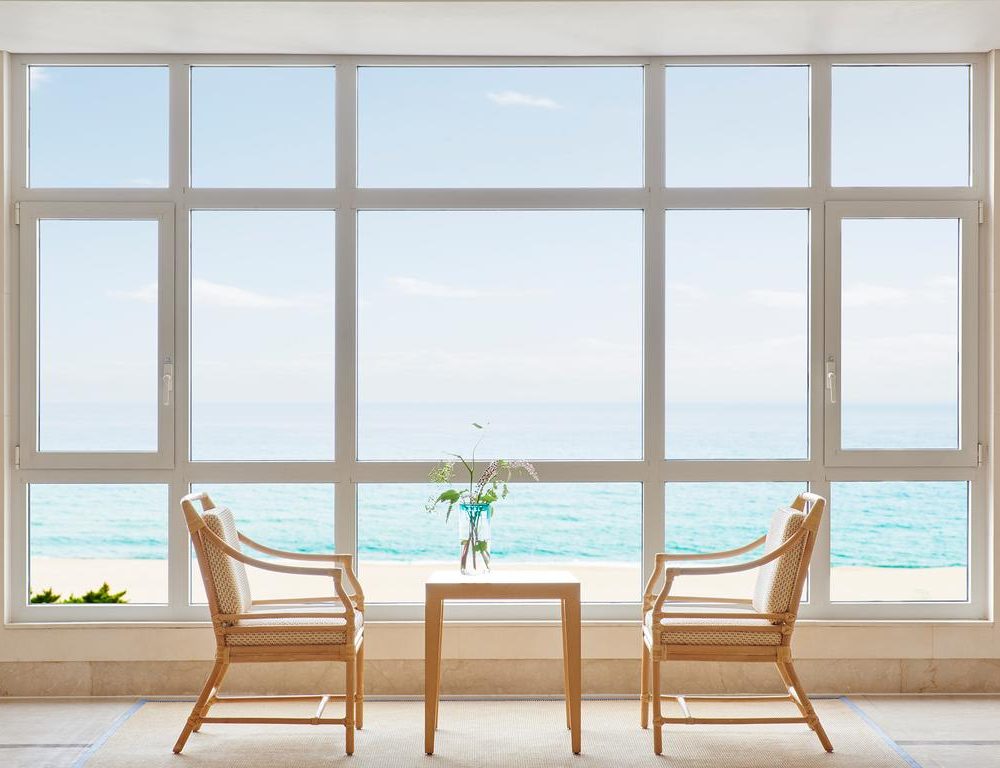
Naksan Beach Hotel
Less than five minutes from the beach, this hotel has a beautiful view of the ocean and is really close to Naksansa Temple which is also a must see in the area. It’s especially great for families as some rooms feature multiple bathrooms, multiple rooms, and a small kitchen area as well. Look into it if you’re traveling with a small group for sure.
Check out Naksan Beach Hotel on Booking.com or on Agoda.com
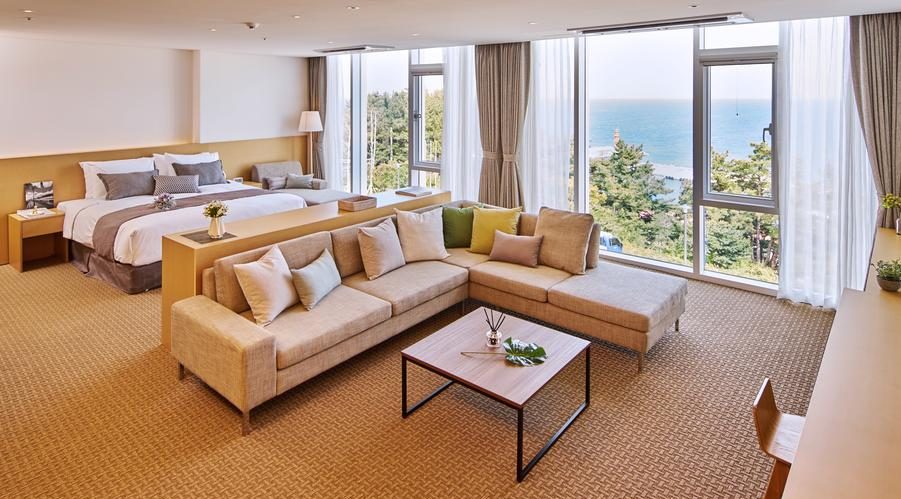
History
Originally founded in 671 C.E. by Monk Uisang-daesa, the story goes that Uisang heard there was a Guanyin Bodhisattva, the Buddhist Goddess of mercy, in a cave on the east coast of Korea. He went and prayed to meet the Bodhisattva and on the seventh day of praying a crystal was placed in front of him.
When Uisang left the cave with the crystal, a dragon from the sea appeared and gifted him Yeouiju, a divine object. Uisang didn’t want the gifts though. He wanted to meet and talk with the Bodhisattva. So, he continued to pray.
On the tenth day of praying the second time, the Bodhisattva appeared and said, “If you go to the top of the mountain above where you are standing, there will be two bamboo trees. Go there and build a temple.” And, that’s what he did.
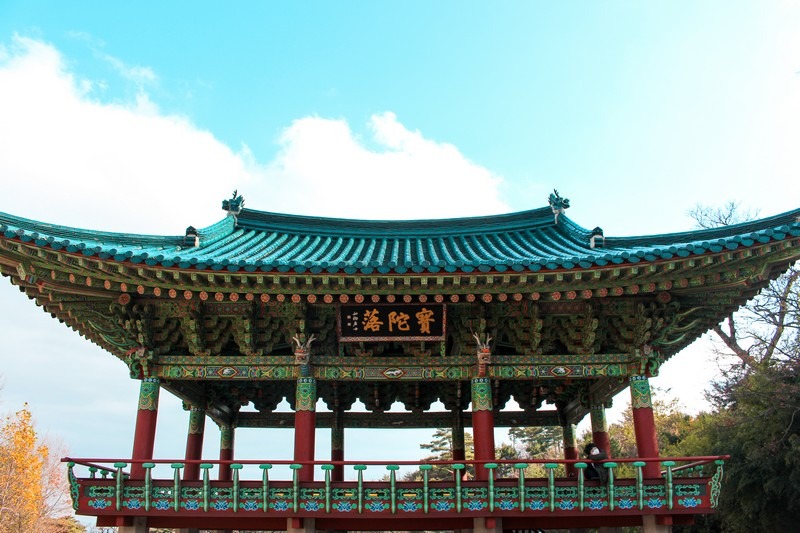
Naksan is a shortened form of Botanakgasan in Korean, which refers to “Potalaka Mountain” which is the place where the Bodhisattva is believed to live.
The temple was designated as Historic Site No. 495 in 2009 and though it was destroyed, rebuilt, reconstructed and expanded numerous times throughout history, it still holds a lot of cultural and historical value.
In April of 2005, the temple was completely destroyed by a fire but like it had been so many times before, it was rebuilt for new visitors and adventurers to the area.
What You’ll See
Sitting on a hill on the northernmost end of Naksan Beach, one can spot the 18 meter high Bodhisattva of Mercy, Haesugwaneumsang, the largest of her kind in the region, while lying on the beach enjoying the sun. As she gazes out onto the sea and the playful people below her, she invites those in the area to stop by and really Naksansa Temple (낙산사) is a must see.
The Naksansa Temple is part of the Jogye Order, the same order that Jogyesa Temple and Bulguksa Temple in Gyeongju are apart of. The temple is considered one of the great eight scenic areas, or Gwandong Palgyeong (관동팔경), in the Eastern region of Korea.
Depending on the season, you might want to visit at different times. I would recommend visiting early in the morning as the temple in the summer as the temple is quite popular but not only that, it requires quite a bit of walking up and down hills and steps. In the heat of the summer, the visit will certainly get the sweat dripping if visited in the middle of the day. In the late autumn and early winter when I recently visited, it was nice to visit midday when the sun was overhead and helped to warm us up as we walked.
When I first visited many years back, there was a main entrance that started in a small courtyard with a cafe. Now, there are two entrances so you’ll either start closer to the sea with a cafe and a pavilion before walking up the mountain to see the Bodhisattva and the buildings. Or, you’ll start with the buildings and the Bodhisattva before heading to the pavilion and the cliff.
Wonder what all of the colors on a Korean Buddhist temple are for? Wonder what they symbolize? Learn more about dancheong before you go so you can really appreciate everything that you’re seeing at Naksansa Temple.
Uisangdae Pavilion
Uisangdae Pavilion built on the top of a cliff is where it is said that Uisangdae meditated. The hexagonal pavilion was built in commemoration of Uisang in 1925. The original pavilion was dismantled, repaired and rebuilt in 2009 and is one of the most popular places to take a photo on the temple grounds as you can see the pavilion, the Bodhisattva, and the ocean.
Don’t forget to take a seat and just enjoy the quiet surroundings.
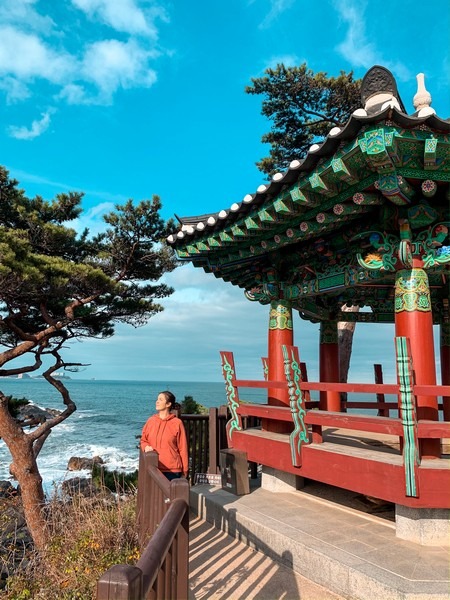
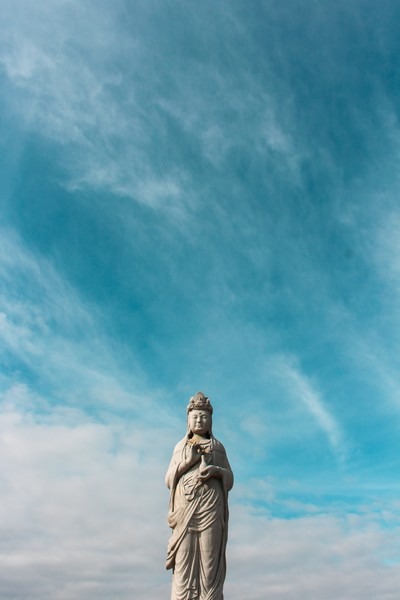
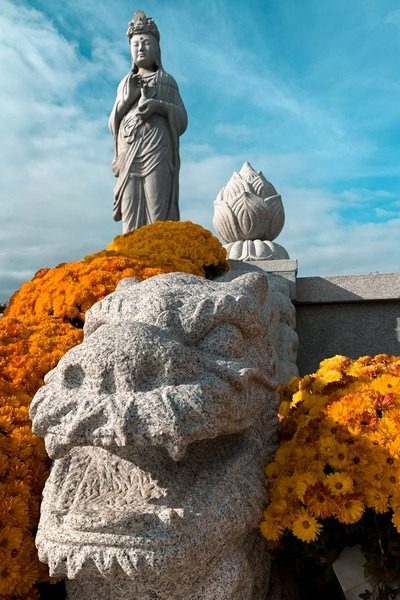
Haesugwaneumsang
The statue that overlooks the sea and the mountain is Haesugwaneumsang, or Gwanseeum-bosal. The Bodhisattva of Mercy faces the southeast and stands 15 meters tall. Made from white granite in 1977, she is peacefully at the summit where benches have been placed in a circle around her for visitors to find their own serenity in the moment. She is beautiful and is at the highest point. Once you get there, it’s all down hill.
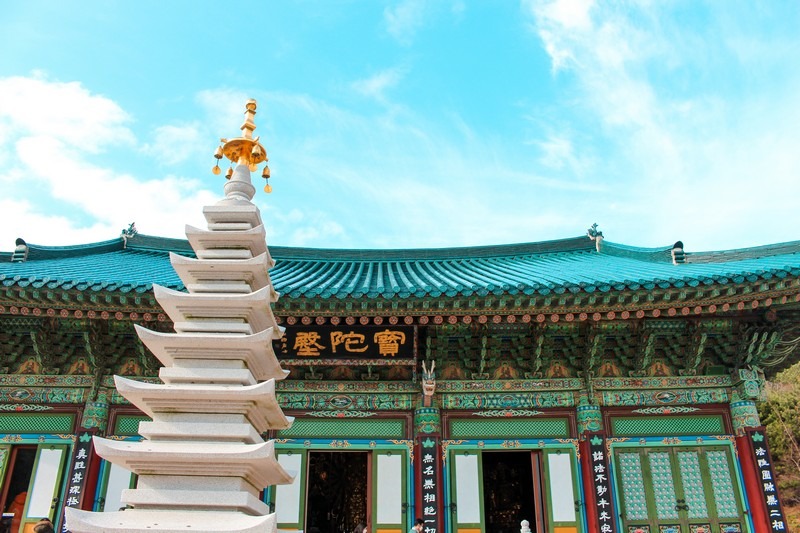
Botajeon Hall & Lotus Pond
If you head back around from the pavilion to the courtyard and follow the signs in the other direction, you’ll come to a beautiful lotus pond with some of the largest flowers I’ve seen here. There’s a flat stone in the middle that people toss coins onto before heading up the steps to Botajeon Hall.
I highly recommend taking off your shoes and stepping inside to see the unique and beautiful Bota-jeon statue inside as well as the numerous statues that surround it.
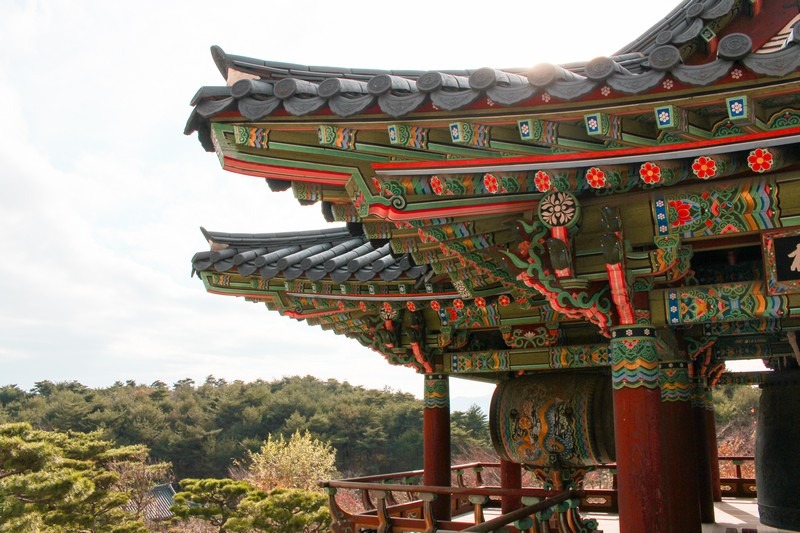
Dongjong Bronze Bell (동종)
The Bronze Bell is Treasure No. 479 and was housed in a bell tower near Gohyangsil Hall. Unfortunately the original bell that was cast in 1469 at the order of King Yejong to commemorate King Sejo’s visit to Naksansa Temple melted during the fire in 2005 but it was recast in 2006.
It is 158 centimeters high and 98 centimeters wide. The crown is decorated with sculptures of two valiant dragons spiraling toward each other. There are also lotus petals and other beautiful carvings to muse at.
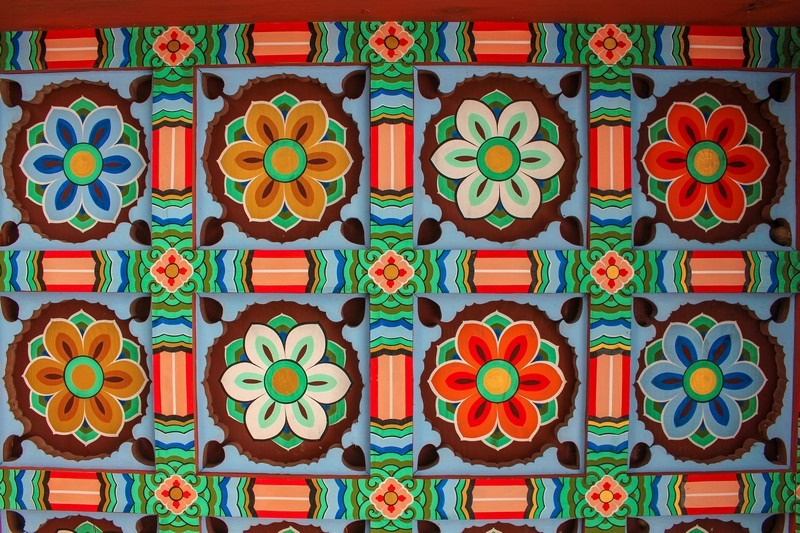
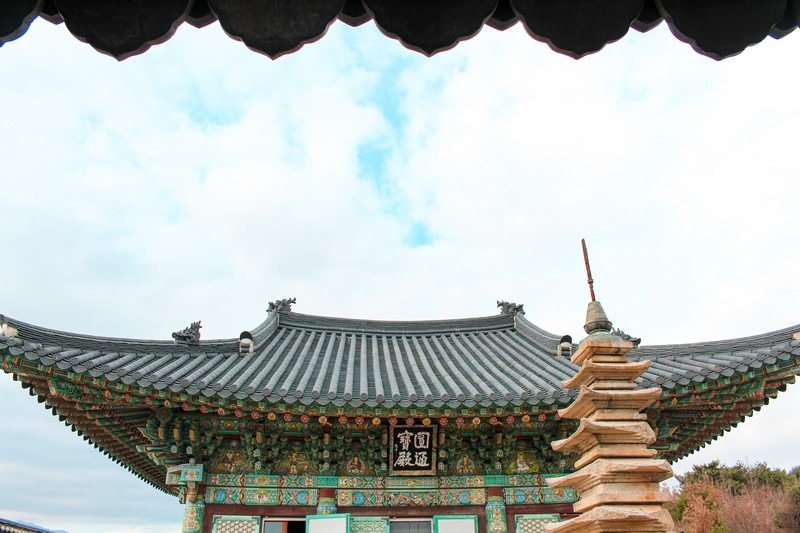
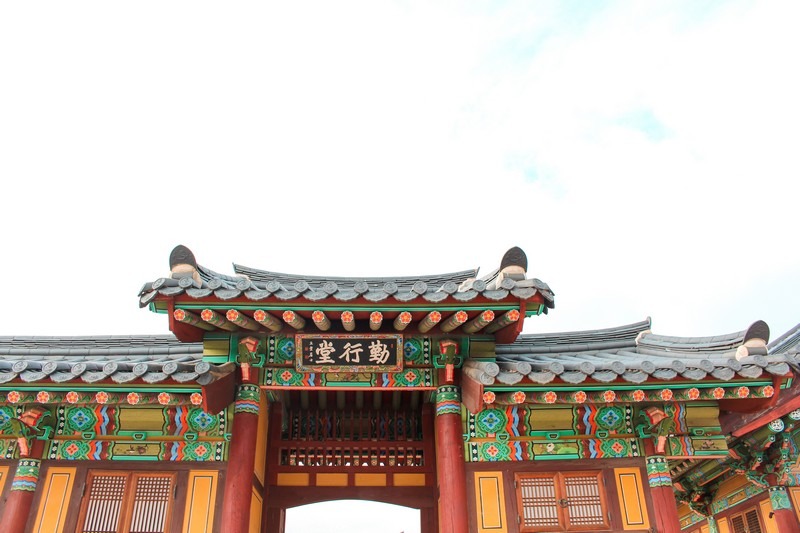
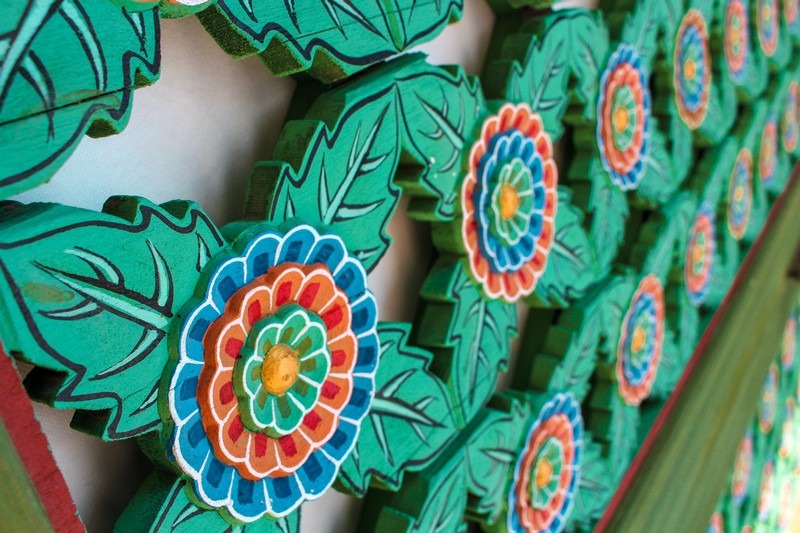
Wontongjeon Hall
From the bell, you’ll see a number of pavilions and buildings that will lead you to Wontongjeon Hall, the main hall of the temple. There is a 7-story stone pagoda in front of the hall and of course like all of the halls, be sure to walk around and enjoy the dancheong and other beautiful artworks on the exterior before entering to see Gwanseeum-bosal inside. The Bodhisattva of Compassion has an ornate golden crown. She dates back to the Joseon Dynasty and was designed in the traditional Goryeo Buddhist style. The statue is Korean Treasure #1362.
I think Naksan Temple is an absolute must see if you’re in the Yangyang-gun region. If you’re headed to the beach in the summer, visit in the morning before you leave. If you head to the area in the autumn or winter, go midday and enjoy the ocean views. The complex is large but a lovely walk.
Did you like this post? Pin It!
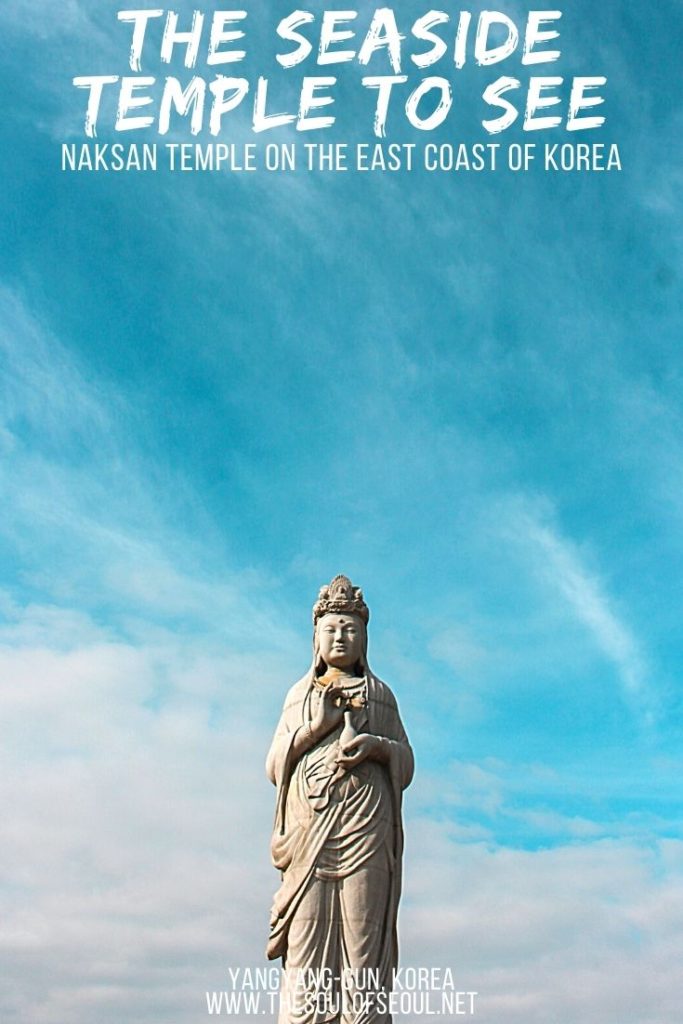
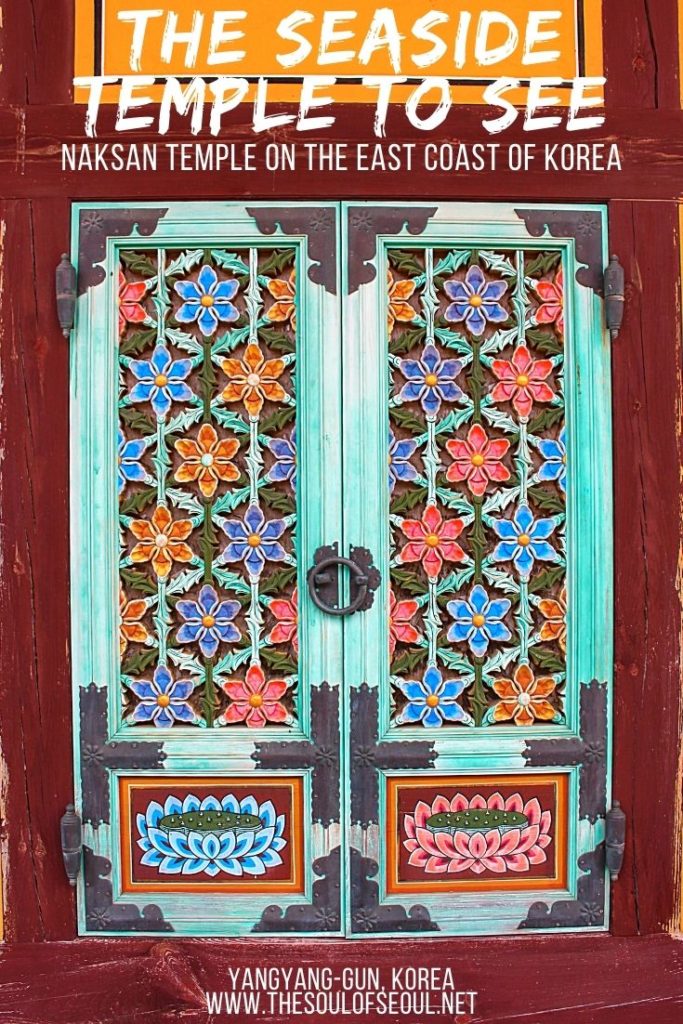
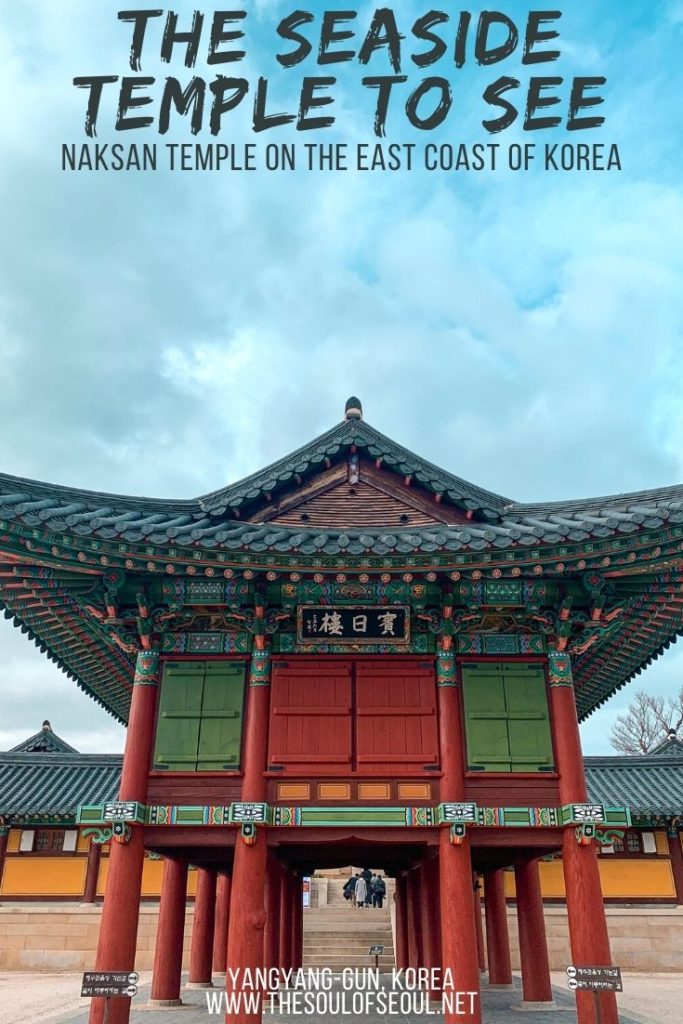
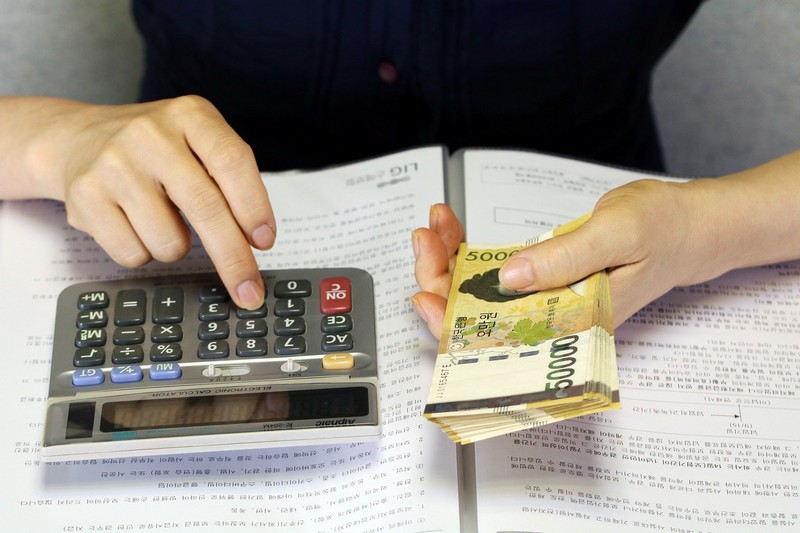
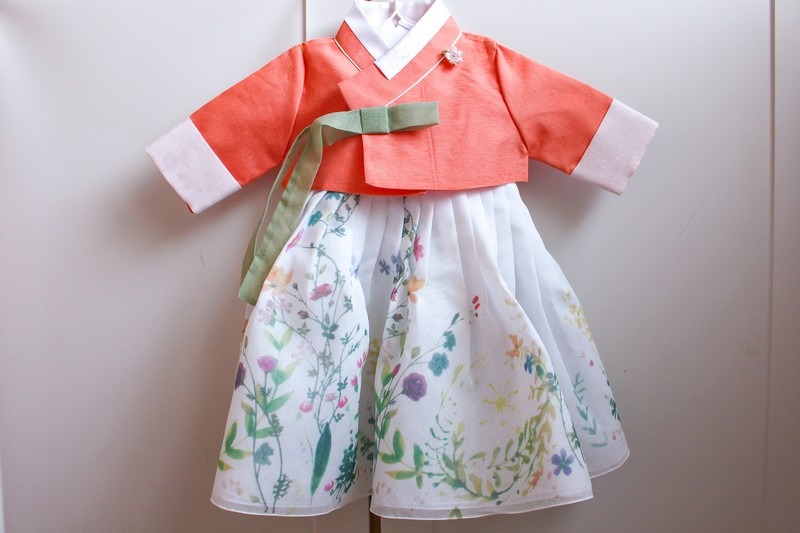
3 Comments
snowy
im thinking of templestay here, but if a person is travelling and has luggage, will they be able to get up to the temple…?
Hallie Bradley
Yeah, it’s not quite a hike like a lot of temples. This one is fairly easy to get up to. I wouldn’t try and take super heavy luggage, but even a rolly bag would be okay. Also, if you’re traveling from Seoul, you can store luggage at Seoul station and other stations in lockers if you don’t want to take a lot with you or something.
Mason
Well written. I like Naksan as well. It’s free admission until the end of this year because of coronavirus. If you need any suggestions about where to visit in Korea please ask. I can try to give some ideas as I have been to many places in Korea.